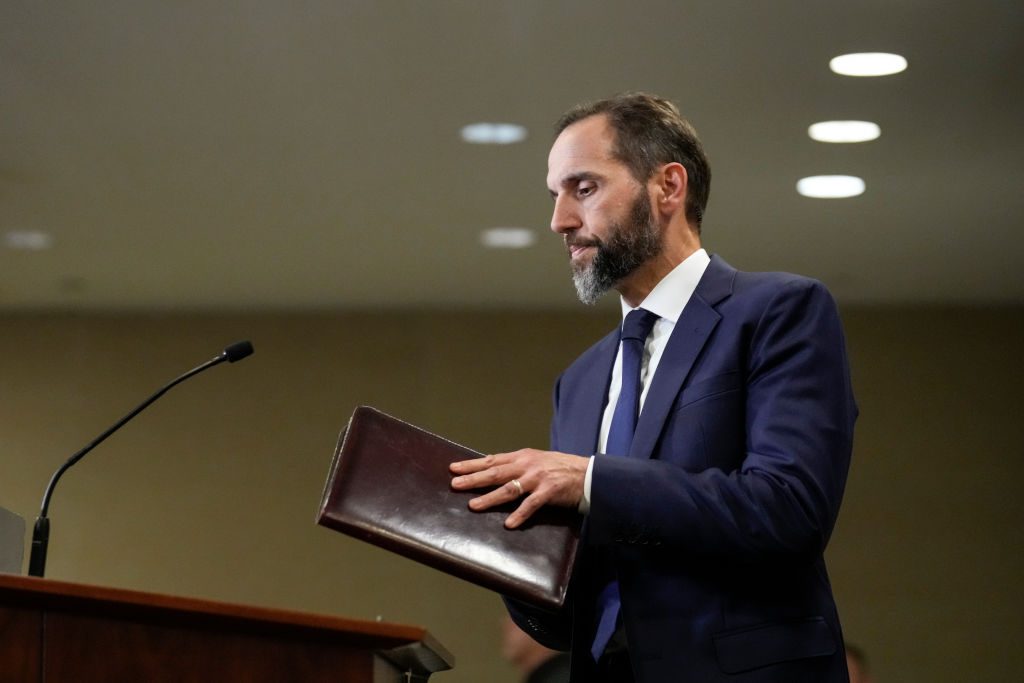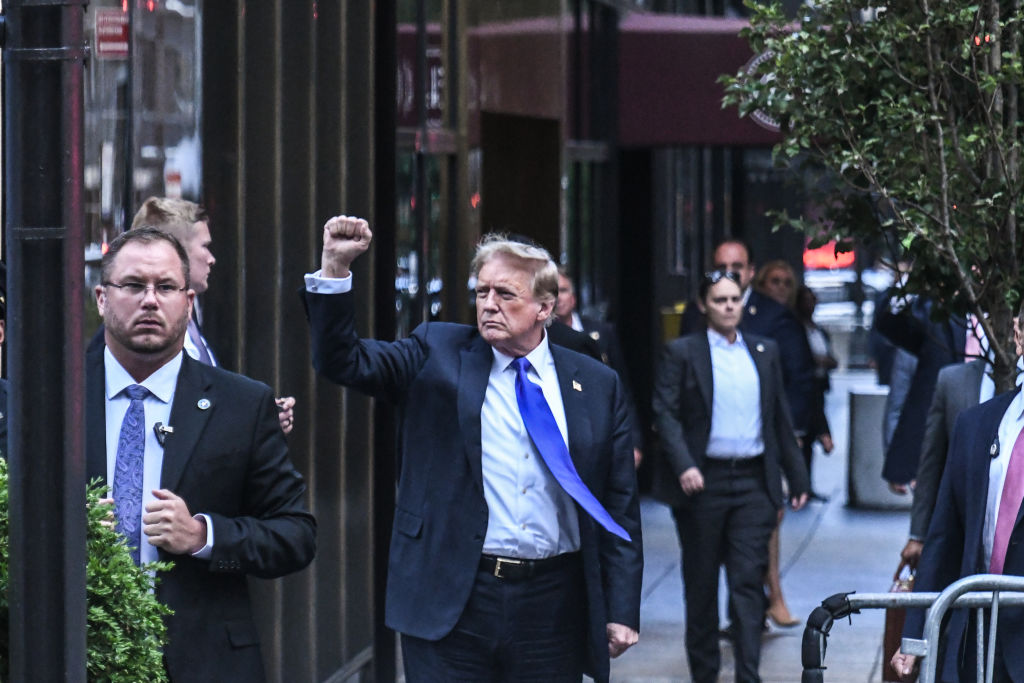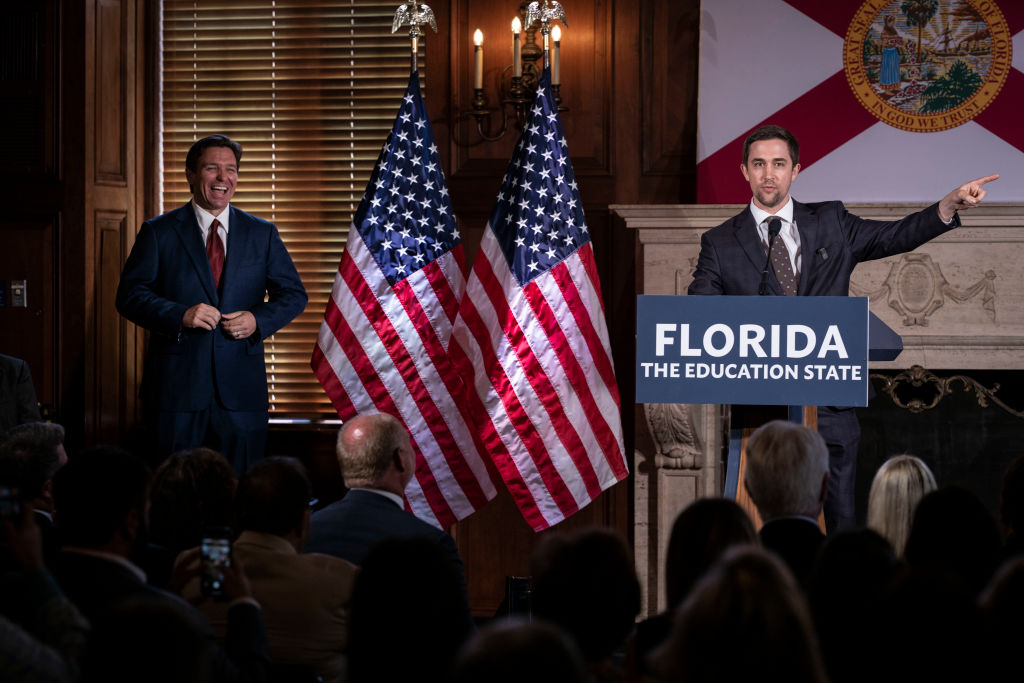A new America First organization steps into the fray.
Averting Crisis

A face-saving measure could let the country avoid Constitutional calamity.
On April 25, 2024, the Supreme Court heard oral argument in the matter of Trump v. United States. Trump’s attorneys argued that the president has absolute immunity for official acts and that the federal prosecutions against him should be dismissed. The government argued the opposite. Back and forth they went. It was all very interesting to lawyers, but nothing in 192 pages of transcript will persuade any partisan to change their views.
Buried in those 192 pages, however, was a short exchange between Justice Thomas and Trump’s attorney, John Sauer. Thomas asked: “Did you, in this litigation, challenge the appointment of special counsel?” (27:45 on the audio.) This was a reference to an amicus brief filed by former attorney general Ed Meese and others. This seemingly off-handed question has now become the central obstacle to the government’s case. But, as I explain below, it is also a release valve that can avoid a constitutional crisis while permitting the administration to “save face.”
Substance, Substance, Substance
Trump’s attorneys raised the immunity defense in the “insurrection case.” He lost at the district court level, but the matter was appealed to the DC Circuit. There, Judge Florence Pan posed several intelligent hypotheticals to Trump’s attorneys: could the President sell military secrets, sell pardons, or use the Navy SEALS to assassinate political opponents? Trump’s lawyer was a bit flummoxed and it did feel like the legal equivalent of a “gotcha” moment that ends debate immediately. But though these questions were rhetorically effective, this “parade of horribles” is more theoretical than real.
By the time the matter reached the High Court, Sauer had put some more thought into the matter. When Justice Jackson alluded to the possible parade of horribles, suggesting that the only thing keeping the President in line was the threat of prosecution, Sauer had his own “mic-drop” moment: “The regime you’ve described [your honor] is the regime we’ve operated under for 234 years.” The implication being: “and somehow the republic survived.”
In retrospect, this is even more obvious than it sounds. Not only has this hypothetical renegade President not been a problem in our country’s history, but even were we to elect a President who blatantly disregarded the rule of law, the recourse we need—the recourse upon which our form of government depends—is the ability to remove him from the Presidency, not prosecute him. At no point in this entire prosecution has anybody suggested that Donald Trump is immune from impeachment or removal from office, whether or not he is immune from prosecution.
Our constitutional republic requires a strong executive who can exercise independent judgment, make tough calls without being second guessed, deploy awesome power domestically and abroad, and implement Congressional will with alacrity. At the same time, we must ensure that the man who is the President cannot misuse his power and destroy our form of government. These interests are in tension.
That tension is resolved by the House of Representative’s impeachment power and the subsequent power of the Senate to try all impeachments. These powers promote the President’s respect for the rule of law and deter misconduct. Most importantly, they preserve our form of government by affording us the means to remove a bad actor from the presidency. It is that interest—the ability to remove the bad actor—that is in greatest tension with the interest in a strong executive.
But the criminal law has no capacity to remove Trump from office or even to prevent him from running again, though as some of the Justices observed, it can undermine the President’s lawful initiative with the threat of post-presidency prosecution. So why pursue criminal prosecution, except for the purpose of gratuitous punishment? That is the only thing that the criminal law can do to the President that the impeachment process cannot.
On reflection, this is absurd. We’re supposed to believe that the threat to the United States from Trump is so dire, so grave, so serious, that he must be punished. Must! But, oh, yes, he’ll still be able to be the President again.
When The Devil Turns Round On You
The problem with trying to catch a wolf by the ears is that you might succeed–and then you’re holding a wolf by the ears. By channeling broad political power through the narrow criminal justice system, the regime has caught its putative wolf. Despite its efforts, Trump is going to be the Republican nominee. He is going to be on the ballot in every state. And he may win the presidency. Criminal procedure is powerless to stop it, so now the regime doesn’t know what to do. It didn’t think this far ahead. In the absence of serious thinking on the matter, the criminal justice system stumbles through its routine. Trial, then conviction, then sentencing, then … what? Jail? House arrest? This is all very bad for the rule of law, our form of government, and for fellow-feeling among citizens.
But it’s also very bad for the regime for two reasons: first, when reminded how astonishing all this is, many Americans are, in fact, astonished. Using the FBI to raid Mar-a-Lago, forcing Trump to pose for a mug shot, arraigning him, and forcing him to sit through the first of these show trials, is more than a mere transgression of political norms; it is unbecoming of a great country. It is beneath the United States of America.
For this reason, even if all these supposed crimes were real crimes, a large majority of people would prefer they be swept under the proverbial rug. The regime refuses to do this, however, and so it looks increasingly unhinged to an increasing segment of the population, even among those who ordinarily scorn politics. The regime overestimated the extent to which solid citizens would recoil at the thought of voting for a “convicted felon,” because it underestimated the extent to which its lawfare had degraded the probity of the institution of criminal justice.
I presume the regime would prefer not to be perceived as unhinged.
Second, there’s the cold calculus of Sir Thomas More in A Man for All Season:
And when the last law was down and the Devil turned round on you, where would you hide … the laws all being flat? This country is planted thick with laws, from coast to coast, man’s laws, not God’s, and if you cut them down … do you really think you could stand upright in the winds that would blow then?
I suspect there are those in power who, today, are asking themselves whether they’ve gone too far. Could a prosecutor reasonably conclude that these prosecutions themselves are indictable offenses? Do they fit, say, within the technical corners of federal criminal law? Consider, as just one example, 18 U.S.C. § 242—“Deprivation of rights under color of law.” It wouldn’t be difficult for a motivated attorney general to prosecute some current officials on the theory that “under color of law … [they] willfully subjected [Trump] … to the deprivation of any rights, privileges, or immunities secured or protected by the Constitution.” The rights of assembly and press and to petition the government for redress of grievances are just three of the five rights mentioned in the First Amendment alone. Was Donald Trump not doing these things on January 6? What do you think a jury in Tennessee or Texas would say? This is not even a particularly strained reading of § 242. It’s certainly less strained than Smith’s application of 18 U.S.C. § 371 (fraud conspiracy) as alleged in the first federal indictment. And there are many federal crimes that a creative and dogged prosecutor can collect evidence around.
I think it is unpleasant that our criminal justice system should operate this way. Language in a statute should not be used in a hyper-literal way to prosecute one’s political opponents. But if one side can re-envision the law to prosecute the other side’s candidate (and former President), then what’s left to prevent the application of this new standard to everyone, private citizen and public official alike? Thomas More’s answer was: Nothing.
That’s what I meant when I referred to the unpleasant business of holding people to account for this misapplication of the law. Some on the political Left have realized the conundrum and are looking for a face-saving way out of this mess–a way to let go of the wolf’s ears without being bitten. Fortunately, we’ve got one: Jack Smith was never confirmed by the Senate.
Process, Process, Process
The Meese brief mentioned above raised an argument Trump’s attorneys initially failed to raise, namely, that Smith “does not have the authority to conduct the underlying investigation” because he is a “superior rather than inferior officer” and, as such, can only be appointed “by the President [] with the advice and consent of the Senate.” Smith was appointed by Attorney General Merrick Garland, not by President Biden with the Senate’s consent.
Either Smith is a superior officer, in which case his appointment by Garland was unconstitutional and the federal cases must be dismissed; or Smith is an inferior officer and has been taking directions from Garland who takes directions from Biden—directions, that is, to prosecute Biden’s political opponent. The administration vehemently denies the latter, calling it a “conspiracy theory” and insisting that Smith is independent of Biden and Garland. But, if Smith is independent, then he’s a superior officer and not lawfully appointed.
After the Supreme Court argument, Trump’s attorneys asserted this same argument in the Florida district court case. There, Judge Aileen Cannon is taking it seriously, despite a tsunami of unhinged propaganda to intimidate her.
This brings me to the face-saving compromise that would enable American politics to resume a safe course away from crisis.
The government should backtrack in the Florida district court case. It should replace Smith with the U.S. Attorney for the Middle District of Florida (a superior officer) and concede that Smith was not confirmed by the Senate. Doing this would allow the administration to continue pretending that Biden had nothing to do with these prosecutions which, maybe, just maybe, weren’t such a good idea after all.
This about-face at the district court would attract the Supreme Court’s attention, allowing it to avoid the tricky immunity question described above and simply rule that Smith’s appointment was unlawful. Doing so would result in the immediate dismissal of the two federal cases against Trump, while permitting the regime to continue insisting on the legitimacy of its prosecutions even as it lets go of the wolf’s ears. You can envision the New York Times headline: “Guilty Trump Escapes on Technicality.” Fine. Let them pretend they won. At least we avoid a constitutional crisis.
The American Mind presents a range of perspectives. Views are writers’ own and do not necessarily represent those of The Claremont Institute.
The American Mind is a publication of the Claremont Institute, a non-profit 501(c)(3) organization, dedicated to restoring the principles of the American Founding to their rightful, preeminent authority in our national life. Interested in supporting our work? Gifts to the Claremont Institute are tax-deductible.
It's now up to the American people.
The Left’s efforts against reforming New College reveal totalitarian impulses.



